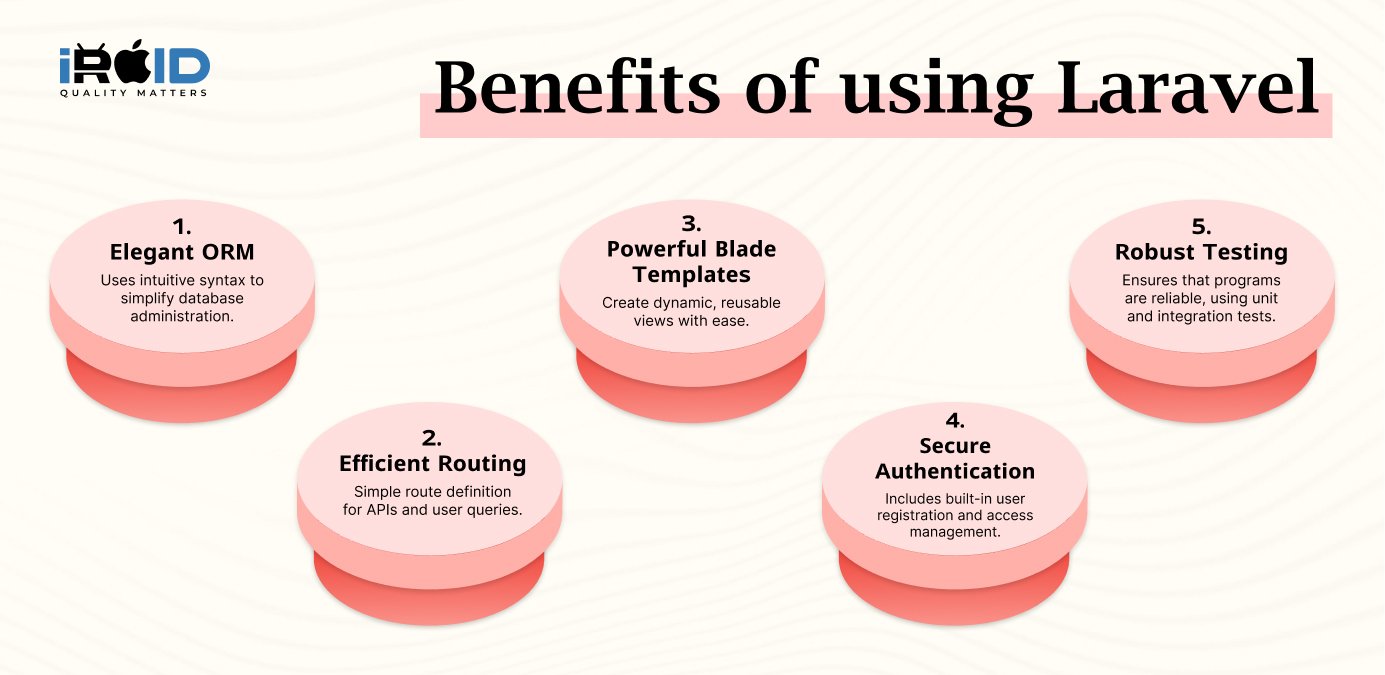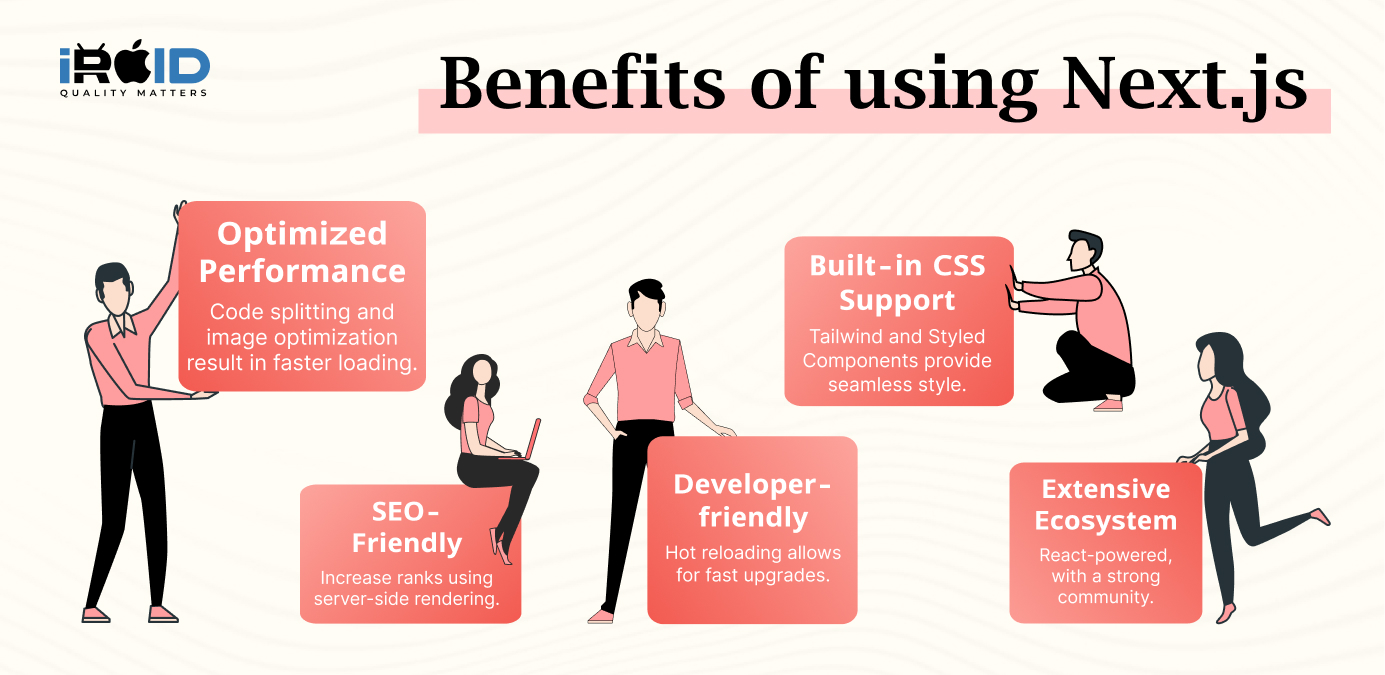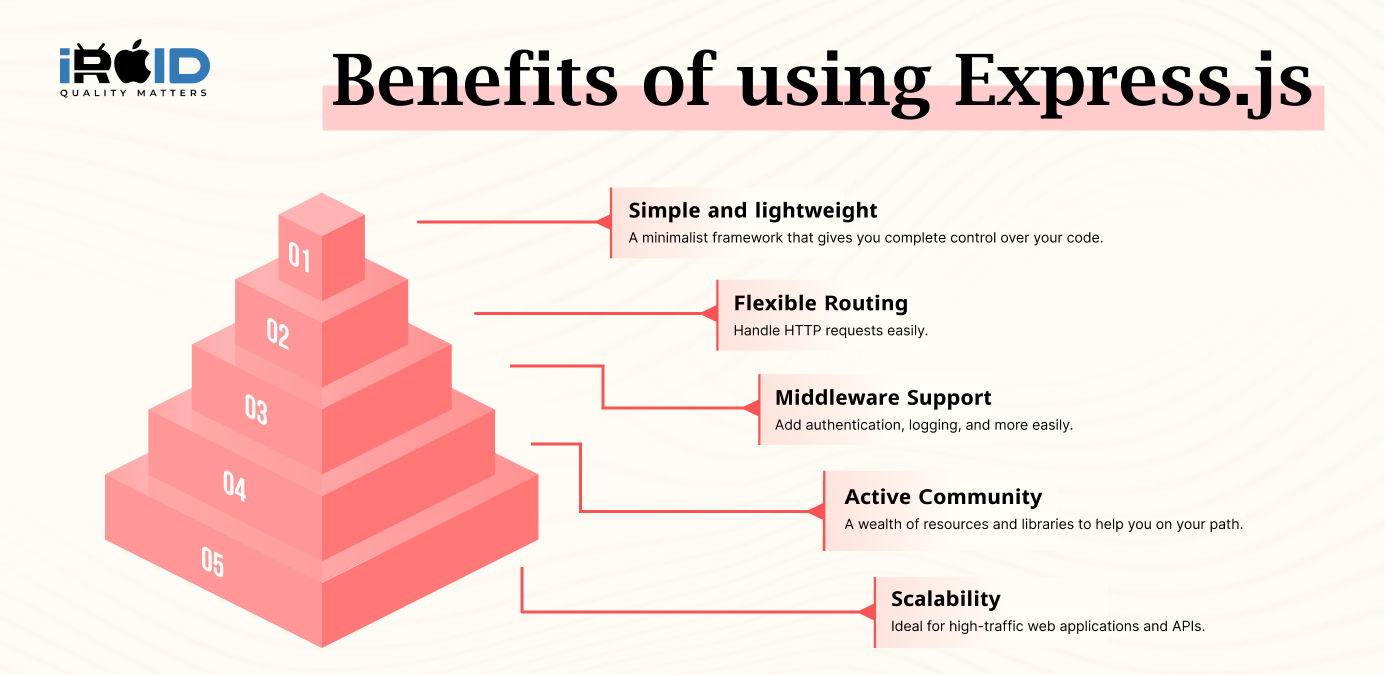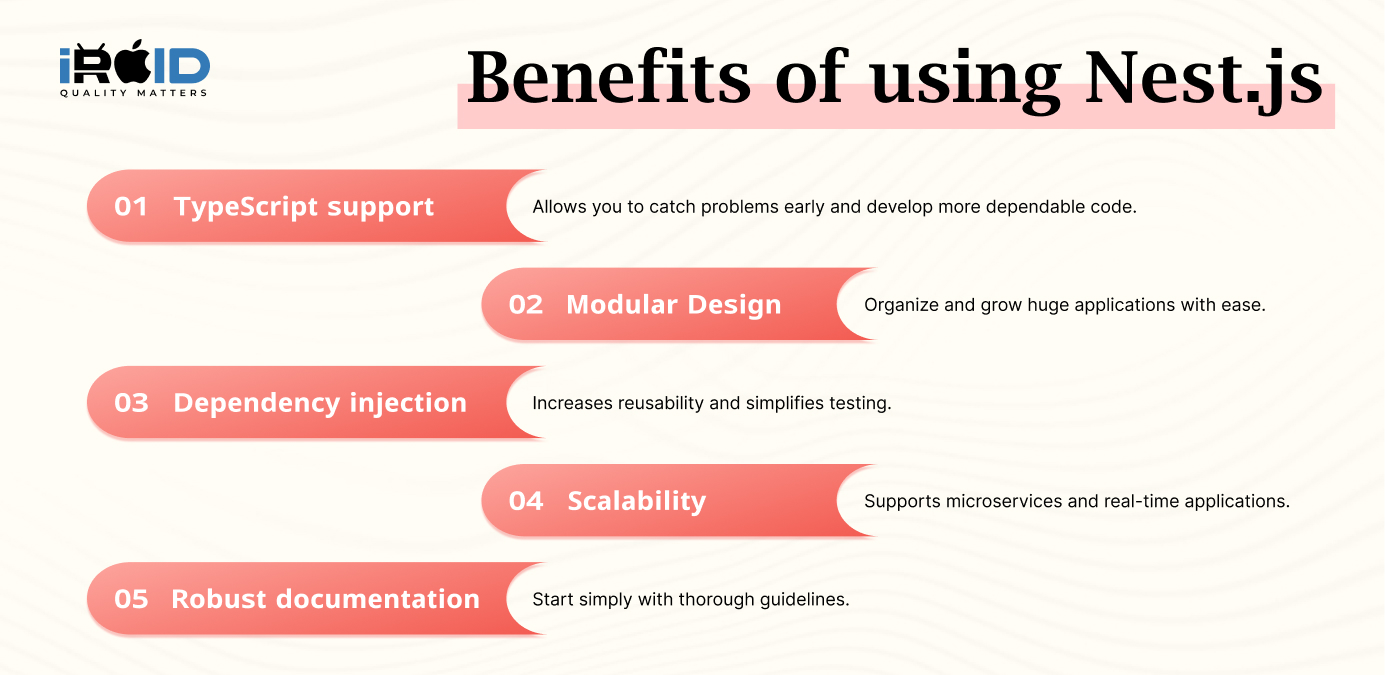Four popular web development frameworks: Laravel (PHP), Next.js (React), Express.js (Node.js), and Nest.js (Node.js), highlighting their features, benefits, and reasons for choosing them.
This article provides a comparative overview of Laravel, Next.js, Express.js, and Nest.js, highlighting their key features, advantages, and use cases to help developers choose the most suitable framework for their projects.
What is Laravel?
Laravel is a popular open-source PHP web framework that is known for its elegant syntax and developer-friendly features. It follows the Model-View-Controller (MVC) architectural pattern, which separates the application logic from the presentation layer. Laravel provides a robust set of tools and libraries that make web development efficient and enjoyable.
Why do we Choose Laravel?
There are several reasons why developers choose Laravel as their go-to web framework. For starters, Laravel offers a clean and expressive syntax that allows developers to write code that is both readable and maintainable. It also provides a rich set of features out-of-the-box, including database migration, routing, and authentication, which saves developers valuable time and effort. Additionally, Laravel has a large and active community, which means there are plenty of resources and support available for developers who are just starting with the framework.
Benefits of using Laravel

1. Elegant ORM: Laravel's Eloquent ORM (Object-Relational Mapping) simplifies database management by providing a simple and intuitive syntax for interacting with databases. It allows developers to work with database tables as objects, making queries and relationships a breeze.
2. Efficient Routing: Laravel's routing system enables developers to easily define application routes and HTTP verbs, making it seamless to create RESTful APIs and handle user requests.
3. Powerful Template Engine: Laravel's Blade template engine provides a sleek and intuitive way to create dynamic and reusable views. It offers features such as template inheritance, control structures, and easy integration with front-end frameworks like Vue.js.
4. Secure Authentication: Laravel comes with built-in authentication and authorization functionalities, making it easy to implement secure user registration, login, and access control.
5. Robust Testing Suite: Laravel provides a comprehensive testing suite that makes it simple to write unit tests and integration tests for your applications. This ensures that your code is reliable and free of errors.
What is Next.js?
Next.js is a React framework that allows developers to build server-side rendered (SSR) and statically generated (SG) web applications. It provides a flexible and efficient development experience, making it a popular choice among developers.
Why do we Choose Next.js?
Next.js offers a variety of benefits that make it a compelling choice for web development. Firstly, it allows for server-side rendering, which improves performance and enables search engine optimization (SEO). This means that your website will load quickly and be easily discoverable by search engines. Additionally, Next.js supports static site generation, enabling you to pre-render pages at build time and serve them as static HTML files. This further enhances performance and reduces the load on the server.
Benefits of using Next.js

1. Optimized Performance: Next.js optimizes web application performance by automatically splitting JavaScript code and assets, allowing for faster and more efficient loading times. It also supports automatic image optimization, lazy loading, and code splitting, resulting in a highly performant web application.
2. SEO-friendly: Next.js supports server-side rendering, allowing search engines to crawl and index your website effectively. This can lead to improved search engine rankings and increased organic traffic.
3. Enhanced Development Experience: Next.js offers a hot-reloading development environment, which means that any changes you make to your code are immediately reflected in the browser without requiring a manual refresh. This speeds up the development process and improves developer productivity.
4. Built-in CSS Support: Next.js has built-in support for CSS-in-JS libraries like Styled Components and Tailwind CSS. This eliminates the need for additional configuration and allows for seamless integration with your preferred styling solution.
5. Extensive Ecosystem: Next.js benefits from the vast React ecosystem and has a vibrant community. This means there are numerous plugins, libraries, and resources available for developers to leverage, making development faster and easier.
What is Express?
Express.js is a fast and minimalist web application framework for Node.js. It provides a simple and flexible way to build web applications and APIs, making it a popular choice for developers working with Node.js.
Why do we Choose Express.js?
Express.js offers several advantages that make it a preferred choice for building web applications. One of the key reasons is its minimalistic design, which allows developers to have greater control and flexibility over the application architecture. Express.js provides a lightweight and unopinionated framework that gives developers the freedom to choose the components and libraries they want to use.
Benefits of using Express.js

1. Simple and Minimalistic: Express.js follows a minimalistic approach, which means it provides only essential features out of the box. This lightweight framework allows developers to have more control over their code and makes it easier to understand and debug.
2. Flexible Routing: Express.js has a powerful and flexible routing system that enables developers to define routes and handle incoming HTTP requests easily. It supports various HTTP methods, URL pattern matching, and parameter extraction, making it highly versatile.
3. Middleware Support: Express.js has robust middleware support, allowing developers to add additional functionality to their application's request-response cycle. Middleware functions can be used for authentication, logging, error handling, and more, making the development process more efficient.
4. Active Community: Express.js has a large and active community of developers. This means there are numerous resources, tutorials, and third-party libraries available that can help streamline the development process and solve common challenges.
5. Scalability: Express.js is well-suited for building scalable web applications and APIs. It can handle a large number of concurrent requests efficiently, making it a reliable choice for high-traffic applications.
What is Nest.js?
Nest.js is a server-side Node.js framework that is built with TypeScript and follows the modular design pattern. It combines elements of both object-oriented programming and functional programming paradigms, providing developers with a scalable and maintainable architecture for building enterprise-level applications.
Why do we Choose Nest.js?
Developers choose Nest.js for a variety of reasons. One of the main advantages is its use of TypeScript, which adds static typing and enhances the developer's productivity, code quality, and maintainability. Nest.js also promotes the use of decorators and dependency injection, which simplifies the development process and makes it easier to write clean and testable code.
Benefits of using Nest.js

1. TypeScript Support: Nest.js leverages the power of TypeScript, a superset of JavaScript that introduces static typing. This enables developers to catch potential errors during compilation and improves code reliability and maintainability.
2. Modularity: Nest.js follows a modular architecture, which encourages the separation of concerns and allows for easy code reuse. It provides built-in support for modules, controllers, services, and providers, making it simple to organize and scale large applications.
3. Dependency Injection: Nest.js utilizes dependency injection, which promotes loose coupling and facilitates the testing and reusability of application components. By injecting dependencies instead of instantiating them directly, developers can easily swap dependencies and write unit tests with minimal effort.
4. Scalability: Nest.js is designed to handle the development of scalable applications. It provides support for microservices architecture, real-time applications through WebSockets, and easy integration with other libraries and frameworks.
5. Robust Documentation: Nest.js has detailed and comprehensive documentation, which helps developers understand and utilize its features effectively. The documentation covers various topics, including installation, architecture, decorators, and testing, making it easy to get started and troubleshoot any issues.
Conclusion
In conclusion, leveraging web frameworks such as Laravel, Next.js, Express.js, and Nest.js is crucial for streamlined web development. These frameworks, coupled with iRoid Solutions, offer developers powerful tools tailored to their specific project needs. From Laravel's sophistication to Next.js' performance, Express.js' flexibility, and Nest.js' modularity, iRoid Solutions enhances these frameworks, empowering developers to create robust and scalable web applications. For further inquiries or collaboration, feel free to contact us.
Blog Related FAQs:
Web development frameworks are pre-written code libraries or platforms that help developers build web applications more efficiently. They provide tools, libraries, and best practices for creating scalable and maintainable software.
These frameworks are popular due to their versatility, community support, and ability to simplify complex tasks like routing, database management, and authentication. Each framework caters to specific use cases, making them valuable in different scenarios.
Laravel stands out for its elegant syntax, built-in features like Eloquent ORM, Blade templating, and seamless authentication systems. Its developer-friendly nature simplifies complex tasks, making it ideal for building robust applications quickly.
While Laravel is primarily a backend framework, it integrates well with front-end technologies like Vue.js and React for building full-stack applications.
React is a JavaScript library for building user interfaces, while Next.js is a framework built on React that adds server-side rendering (SSR) and static site generation (SSG) capabilities.
Yes, Next.js is highly SEO-friendly. Its server-side rendering and static generation features ensure that web pages are optimized for search engines.
Express.js is best suited for building lightweight, high-performance web applications and RESTful APIs. Its simplicity makes it ideal for small to medium-sized projects.
Yes, Express.js can handle a high number of concurrent requests, making it a great choice for scalable web applications.
Nest.js is built on top of Express.js but adds TypeScript support, a modular architecture, and features like dependency injection and decorators, making it more suited for enterprise-level projects.
iRoid Solutions specializes in building web applications using Laravel, Next.js, Express.js, and Nest.js. Services include custom development, API integration, performance optimization, and scalable architecture design.
Recent Blog Posts
Get in Touch With Us
If you are looking for a solid partner for your projects, send us an email. We'd love to talk to you!














